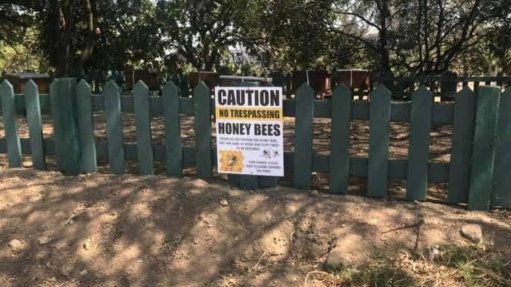
JSE-listed real estate investment trust (Reit) Growthpoint Properties has noted that South Africa is facing a serious shortage of bees, beekeepers and secure forage sites – conditions that are critical for agricultural pollination.
In acknowledgement of World Bee Day on May 20, under the theme ‘Bee inspired by nature to nourish us all’, which highlights the critical roles bees and pollinators play in agrifood systems and the health of South Africa’s, and the planet’s, ecosystems, Growthpoint says eight honeybee hives at its Woodlands Office Park, in Gauteng, exemplify this sentiment.
The company expresses that, while the eight hives at the Woodlands represent a fraction of what is needed nationally, they form part of a larger ecosystem of conservation-aware stewardship.
Growthpoint explains that bees pollinate about 70% to 80% of the foods we eat, adding that of the 1 258 known species in South Africa, only two can be domesticated in hives – but not in the same regions – and they are stretched thin.
The company says the Woodlands colonies are among the 700 that seasonally support macadamia orchards in Barberton, where their pollination boosts crop yields by as much as 70%.
To pollinate South Africa’s 78 000 ha of macadamia trees, an estimated 312 000 colonies are needed.
“Yet the total number of managed colonies nationwide barely exceeds that. Add apples, avocados, butternut and berries to the mix, and the deficit becomes even more alarming,” says Growthpoint.
During off-season periods when farms must be treated with pesticides, these bees require safe, forage-rich refuges.
The Woodlands, with its flourishing stands of acacia, paperbark, fever trees, soetdoring and select non-invasive eucalyptus species, offers exactly that, says Growthpoint.
By maintaining safe, pesticide-free apiaries like those at The Woodlands, Growthpoint says it contributes to pollinator conservation and, by extension, national food security.
Additionally, each hive produces up to 30 kg of honey a year under ideal conditions, though recent erratic weather patterns have dampened yields across the country, from Gauteng to Limpopo.
“This initiative reflects the value of adaptive, site-specific stewardship. The hives benefit from an abundant local food source, contributing to a healthy and balanced ecosystem within the park,” says Growthpoint Properties sustainability manager – projects Martjie Cloete.
“Every small act counts in safeguarding our pollinators. The Woodlands bee project is a reminder that even in urban settings, nature can thrive when given the chance and when our environment is treated as a vital part of our future,” she adds.
Fellow JSE-listed Reit Emira Property Fund has also invested in a bee conservation programme. ![]()